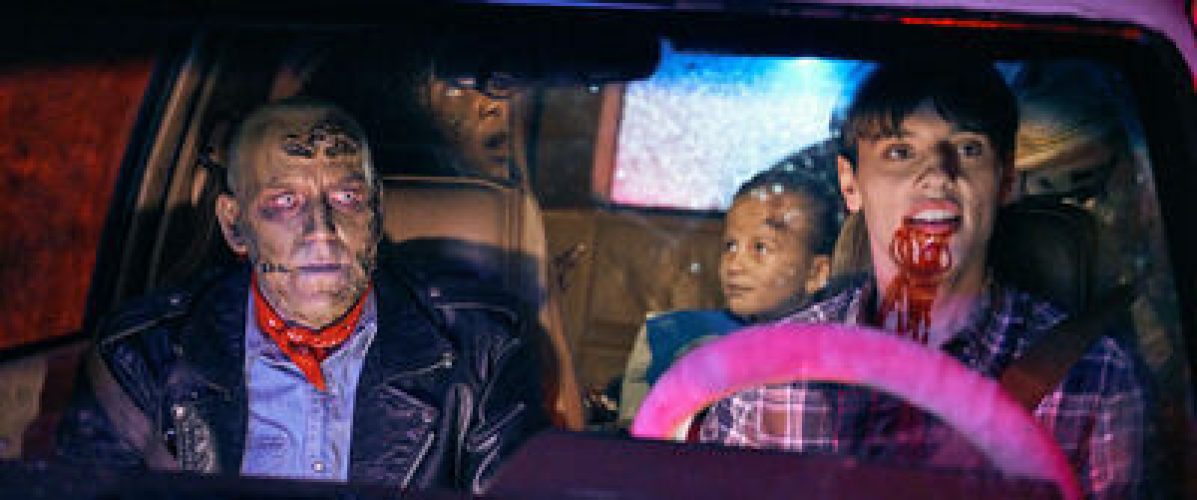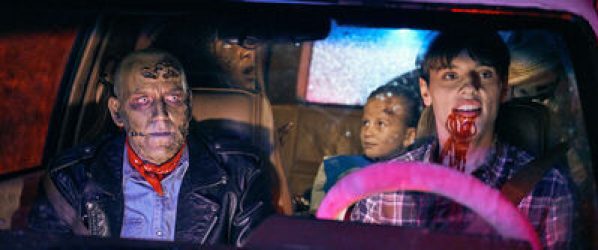Mining the ’80s for its analog ambiance has been a “thing” since the moment the ’80s ended and, at times, it can be very effective. But it’s hard to figure out what exactly the 1987 setting provides the zombie-comedy “The Loneliest Boy in the World,” where a socially awkward kid creates a makeshift family from four zombies who take over his home in a flurry of domesticity. The ’80s are mainly present in nods to outmoded technology (video recorder, an alarm clock, static on the television) and a half-hearted soundtrack, but how any of this adds to the (also) half-hearted story being told is a mystery. Period realism isn’t necessary for a zombie movie, of course, but the film’s atmosphere is at times so highly stylized that the intermittent reminders we’re in the ’80s feels like a cheat, a shorthand hoping to kickstart the nostalgia of being in familiar territory. Except for a couple of brief throwaway moments, and some very welcome gore, director Martin Owen’s “The Loneliest Boy in the World,” doesn’t establish a tone. The film floats on its associations with other things.
Oliver (Max Harwood) isn’t just socially awkward. He grew up in total isolation, protected from the world by his mother (Carol Anne Watts), who barely allows him to leave their house (the exterior of which is conventional, the interior of which is cupcake-frosting-pink, from floor to ceiling). Disaster ensues when Oliver’s mom dies in a gruesome accident, leaving Oliver’s fate in the hands of a bitter over-it social worker (Ashley Benson) and an even more bitter and over-it psychologist (Evan Ross). They tell him that unless he makes a friend in the next week he will have to be sent to an asylum. Oliver is a naive boy, almost like Brendan Fraser emerging from the bomb shelter in “Blast from the Past.” He sets out to make a friend. He talks with Chloe (Tallulah Haddon), a new girl in town, but freaks her out with his life story. He visits his mother’s grave and reports to her on what’s going on on her favorite soap opera. He watches “Alf” every night.
Then the thought pops into his head. Maybe if he digs up some recently buried bodies, he could bring them home as new “friends” and maybe then he won’t have to be locked up. First, he digs up Mitch (Hero Fiennes Tiffin), a kid who died in a freak accident and was described at his funeral as “everyone’s friend.” Oliver then digs up Susanne (Susan Wokoma), little girl Mel (Zenobia Williams), and carousing alcoholic Frank (Ben Miller from “Bridgerton”), who all just died in a plane crash. Oliver props their dead bodies on the couch, moving them around, taking Polaroids of the group. He is very happy. When he wakes up the next morning, he’s shocked to find these four dead people up and walking around, having breakfast, and instantly assuming the roles of a “Happy Days”-style nuclear family, the family he never had.
Why do these unconnected undead strangers decide to play “Leave It to Beaver” for a kid they don’t even know? Why does Susanne, first seen on the plane about to crash, irritated by the kid kicking her seat from behind, come back to life as Mrs. Cleaver, complete with apron and skillet filled with sizzling bacon, scolding her “son” about profanity? When you become a zombie, do you go back in time to 1950s suburbia? You shouldn’t be asking questions like this about a zombie movie, but unfortunately “The Loneliest Boy in the World” leaves too much time to think. Zombies staggering out of the grave and turning their new undead lives into a chipper Mayberry-style panorama is a pretty funny idea (although what it has to do with the 1980s is anyone’s guess), but not enough is made of it. “Blast from the Past” is not about zombies, but it is about celebrating what might be deemed old-fashioned: the joys of having kind attentive parents who inhabit traditional roles and provide a safety net of care around their children. But again, this interesting and subversive idea merely hovers on the edges of “The Loneliest Boy in the World,” present but never explored.
The humor, when it shows up, comes from the incongruity of zombies sharing sweet family dinners, father-son chats, and Mitch the cool older zombie-friend advising Oliver on how to talk to girls. (In other words, Mitch is the Fonz to Oliver’s Richie Cunningham.) The zombies calmly accept that they have been dragged out of the grave to help Oliver learn and grow and change.
Not enough happens in “The Loneliest Boy in the World.” There’s not enough conflict. The film relies too heavily on cliche and hopes the audience won’t notice.
Now playing in theaters and available on digital platforms on October 18th.
Mining the ’80s for its analog ambiance has been a “thing” since the moment the ’80s ended and, at times, it can be very effective. But it’s hard to figure out what exactly the 1987 setting provides the zombie-comedy “The Loneliest Boy in the World,” where a socially awkward kid creates a makeshift family from four zombies who take over his home in a flurry of domesticity. The ’80s are mainly present in nods to outmoded technology (video recorder, an alarm clock, static on the television) and a half-hearted soundtrack, but how any of this adds to the (also) half-hearted story being told is a mystery. Period realism isn’t necessary for a zombie movie, of course, but the film’s atmosphere is at times so highly stylized that the intermittent reminders we’re in the ’80s feels like a cheat, a shorthand hoping to kickstart the nostalgia of being in familiar territory. Except for a couple of brief throwaway moments, and some very welcome gore, director Martin Owen’s “The Loneliest Boy in the World,” doesn’t establish a tone. The film floats on its associations with other things. Oliver (Max Harwood) isn’t just socially awkward. He grew up in total isolation, protected from the world by his mother (Carol Anne Watts), who barely allows him to leave their house (the exterior of which is conventional, the interior of which is cupcake-frosting-pink, from floor to ceiling). Disaster ensues when Oliver’s mom dies in a gruesome accident, leaving Oliver’s fate in the hands of a bitter over-it social worker (Ashley Benson) and an even more bitter and over-it psychologist (Evan Ross). They tell him that unless he makes a friend in the next week he will have to be sent to an asylum. Oliver is a naive boy, almost like Brendan Fraser emerging from the bomb shelter in “Blast from the Past.” He sets out to make a friend. He talks with Chloe (Tallulah Haddon), a new girl in town, but freaks her out with his life story. He visits his mother’s grave and reports to her on what’s going on on her favorite soap opera. He watches “Alf” every night. Then the thought pops into his head. Maybe if he digs up some recently buried bodies, he could bring them home as new “friends” and maybe then he won’t have to be locked up. First, he digs up Mitch (Hero Fiennes Tiffin), a kid who died in a freak accident and was described at his funeral as “everyone’s friend.” Oliver then digs up Susanne (Susan Wokoma), little girl Mel (Zenobia Williams), and carousing alcoholic Frank (Ben Miller from “Bridgerton”), who all just died in a plane crash. Oliver props their dead bodies on the couch, moving them around, taking Polaroids of the group. He is very happy. When he wakes up the next morning, he’s shocked to find these four dead people up and walking around, having breakfast, and instantly assuming the roles of a “Happy Days”-style nuclear family, the family he never had. Why do these unconnected undead strangers decide to play “Leave It to Beaver” for a kid they don’t even know? Why does Susanne, first seen on the plane about to crash, irritated by the kid kicking her seat from behind, come back to life as Mrs. Cleaver, complete with apron and skillet filled with sizzling bacon, scolding her “son” about profanity? When you become a zombie, do you go back in time to 1950s suburbia? You shouldn’t be asking questions like this about a zombie movie, but unfortunately “The Loneliest Boy in the World” leaves too much time to think. Zombies staggering out of the grave and turning their new undead lives into a chipper Mayberry-style panorama is a pretty funny idea (although what it has to do with the 1980s is anyone’s guess), but not enough is made of it. “Blast from the Past” is not about zombies, but it is about celebrating what might be deemed old-fashioned: the joys of having kind attentive parents who inhabit traditional roles and provide a safety net of care around their children. But again, this interesting and subversive idea merely hovers on the edges of “The Loneliest Boy in the World,” present but never explored. The humor, when it shows up, comes from the incongruity of zombies sharing sweet family dinners, father-son chats, and Mitch the cool older zombie-friend advising Oliver on how to talk to girls. (In other words, Mitch is the Fonz to Oliver’s Richie Cunningham.) The zombies calmly accept that they have been dragged out of the grave to help Oliver learn and grow and change. Not enough happens in “The Loneliest Boy in the World.” There’s not enough conflict. The film relies too heavily on cliche and hopes the audience won’t notice. Now playing in theaters and available on digital platforms on October 18th. Read More


